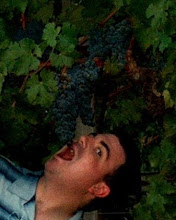For Americans, in general, they enjoy wines that are younger. There is only a small percentage of the population that "collects" wine and consumes it when it is older. Some don't ever consume it and just collect it. I've never understood that and I think the winemakers out there would be disappointed to see their product go to waste - but that is another story.
Young and younger wines are great for many reasons. For starters, young wines tend to be fruit forward. If you smell wine from a barrel after fermentation, it tends to have very strong fruit flavors. Unfortunately, like many things in wine production, young is not the only factor for fruit forward - hotter climates will produce wines with more fruit aromas as well.
Young red wines also have higher levels of tannin (an astringency that comes from the skins and seeds). This can be great with certain food pairings. For instance, if I'm grilling up a Rib-Eye steak, I want a wine with a high tannin level to counterbalance the fattiness of the steak. A young Malbec works really well.
But most importantly, young wines are what we are used to. Rarely do we order an older wine off a wine list - likely because it's too expensive. But also because it's not often available and we don't like to stray away from the "norm".
So for the few that are patient and able to put a wine away for many years, what are the benefits?
Well, let's begin with what you'll encounter first - the aromas. Smells can change dramatically with age in the bottle. What was once a bright red cherry flavor could become dark cherry or cooked cherries or something completely different from cherries, like licorice. One never knows how wine is going to change and develop, but to me that's the interesting part.
One of my favorite things about older wines is their texture. Once in the mouth, these wines can take on some of the best textures my tongue has ever run across. The tannins have generally faded away and what's left is a velvety smoothness that coats the mouth. Now, let's take that same young Malbec that was paired with the Rib-Eye above. Pair it with an aged wine and the steak will overpower the wine. But, cook a Fillet-Mignon and match it up with an older Malbec and you'll likely have a winning combination. Interesting. As the wine ages, the foods it goes with will change too.
Another factor (an overlooked one, I think), is that an aged wine is understated. It takes a lot more concentration to identify flavors and aromas in an older wine than it does in a younger one. Maybe we're more familiar with the fruit flavors of a younger wine, so they're easier to notice. But I think that most wine is consumed without much thought. Really understanding wine is like stopping to smell the roses - it sounds like a good idea, but most people don't take the time to really do it.
Don't take that last statement the wrong way - it sounds kind-of snobby, I know. But I'm okay with "I like this wine" or "I don't like this wine". In most cases, that's good enough. But if you have taken the time to age a wine (or purchased one that was aged properly for you), you should sit down and really think about it. If you're from the area the wine is from, think about what the weather was like that year - if you can remember. Think about the area and what the terrain is like and how that might affect the wine. But most of all, think about what's in the glass. Smell it. Stick your nose in the glass and really smell it. Taste it. What do the aromas and flavors remind you of? You might be surprised how much you know about wine.
Just a quick aside....not all wine has age-able qualities. How do you know? Well, the best thing to do is to ask the source how long to age the wine, if at all. The top three things that allow for a wine to be aged are acid, tannin and sugar. A wine with high amounts of any of these can usually be aged for longer than one that doesn't have them.
So what am I drinking?
A 1996 Zinfandel from Teldeschi Vineyards in Dry Creek Valley. I bought it a couple of years ago (so it was already aged). It's rare to find a Zin that has age-able qualities, but I think this one shows really nicely. For me, the acid that's still apparent in the wine is the staying quality that worked for this particular one.




No comments:
Post a Comment